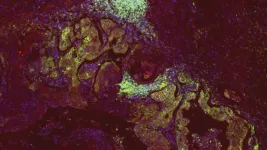(Press-News.org) DALLAS, July 26, 2023 — Existing research shows certain types of migraines can increase the risk of stroke, and there is growing evidence that they may also lead to other types of cardiovascular disease (CVD). To learn more about these connections, the American Heart Association, the world's leading nonprofit organization focused on heart and brain health for all, is providing a total of $2.1 million in grants for seven new scientific research projects. The selected teams of scientists for the “Migraine as a Risk Factor for Stroke and Cardiovascular Disease” projects are from: Brigham and Women’s Hospital in Boston, Massachusetts; Mayo Clinic in Rochester, Minnesota.; Mayo Clinic in Phoenix, Arizona.; Duke University School of Medicine in Durham, North Carolina; Rhode Island Hospital in Providence; the University of South Carolina in Columbia; and Yeshiva University in New York City.
“According to the American Migraine Foundation, 39 million people in the U.S. experience migraines. And while evidence suggests that migraines increase the risk of strokes and possibly other types of cardiovascular disease, there is still much we don’t know about what causes this increased risk,” said neurologist Mitchell S. V. Elkind, M.D., M.S., FAHA, chief clinical science officer of the American Heart Association. “With these new research grants, we hope to create a collaborative group of experts in migraine, cardiovascular disease, stroke, biostatistics and data science to explore these unanswered questions about the cardiovascular complications of migraine.”
Specifically, the researchers are charged with bringing new ideas to analyze and standardize migraine research data from already accumulated datasets in the American Heart Association’s Precision Medicine Platform. This platform is a state-of-the art, cloud-based system that allows researchers to collaborate and analyze large datasets from any computer in the world using a secure environment and the power of machine learning. They’ll pull from existing research on different study populations, including epidemiological studies, clinical trial data, electronic health record data, imaging data, genetic data and more.
The seven research projects, which began July 1, 2023, and are funded for up to two years each, include:
Genetics-informed discovery of etiologic predictors of cardiovascular events among individuals with migraine at Brigham and Women’s Hospital (BWH) – led by Daniel Chasman, Ph.D., an associate professor of medicine at Harvard Medical School and an associate geneticist at BWH, and Pamela Rist, Sc.D., an assistant professor of medicine at Harvard Medical School and an associate epidemiologist at BWH, this team will work to identify new ways of assessing CVD risk among people with migraine. They will determine if there are known risk factors common to both migraine and CVD; search for genes that may contribute to the risk of stroke among people with migraine to determine if these genes may uncover novel biomarkers for CVD risk; and finally, use genetic scores to attempt to discover new risk factors for CVD among those with migraine.
Artificial Intelligence ECG-Based Screening and Prediction Tool to Identify Migraine Patients at Risk for Stroke and CVD at Mayo Clinic in Rochester – led by Chia-Chun Chiang, M.D., a headache specialist and vascular neurologist at Mayo, this team will develop a screening tool to help doctors better identify patients with migraine who may have a higher chance of having a stroke or heart problem, like a heart attack. The tool will be based on an electrocardiogram (ECG), which shows the electronic signals of the heart, and will use artificial intelligence (AI) to analyze the ECG readings, while taking into consideration other patient factors like age, other illnesses and specific features of their headaches. The goal of the tool is to help doctors determine if more tests are needed or if patients need to do certain things to lower their risk and hopefully prevent stroke and heart problems.
Risk modeling of stroke and cardiovascular disease in patients with migraine at Mayo Clinic in Phoenix – led by Catherine Chong, Ph.D., an associate professor of neurology at Mayo, this team will develop a model that includes migraine factors to predict the risk of stroke and heart disease in people with migraine. This model will be built using information from two large databases. A precise prediction model such as this is important for early identification of those at high risk of stroke and heart disease.
MARS: The Migraine And Retinal Stroke Study at Duke University School of Medicine – led by Brian Mac Grory, M.B., B.Ch., M.R.C.P., a vascular neurologist at Duke Health, this team will study the connection between migraine and a less common type of stroke, an ocular stroke, which is a stroke in the back of the eye known as the retina. Using a large data warehouse containing data on people from across the U.S., they will look at what puts people at risk of eye strokes compared with brain strokes and whether migraine medications play a role in causing eye strokes. This can help in early identification and treatment of this type of stroke.
Migraine and Stroke in Women: Leveraging the Observational and Clinical Trial Cohorts of the Women’s Health Initiative at Rhode Island Hospital (RIH) – led by Tracy Madsen, M.D., Sc.M., Ph.D., the associate director of the Sex and Gender in Emergency Medicine Program at RIH, this team will study data from over 160,000 women to better explain the link between migraine and stroke risk in women after menopause. They will study other factors that may raise stroke risk for women with migraine, like high blood pressure, diabetes and the use of medicines such as hormones. Finally, they will look at how problems like inflammation and blood clotting change stroke risk in women with menopause. This research will help women with migraine and their doctors find ways to reduce their risk of stroke.
Testing the role of heart rate variability (HRV) in predicting atrial fibrillation and ischemic stroke in migraine at the University of South Carolina (USC) – led by Souvik Sen, M.D., M.S., M.P.H., the neurology department chair and a clinical professor at USC School of Medicine, this team will explore the risk of stroke and atrial fibrillation (a type of irregular heartbeat) in young people with migraine. They will use data from the large Atherosclerosis Risk in Communities (ARIC) Study, a large research study from the National Heart, Lung, and Blood Institute of National Institutes of Health.
Migraine as a Risk Factor for Cardiovascular Events in the Veterans Health Administration at Yeshiva University (YU) – led by Elizabeth Seng, Ph.D., an associate professor of psychology at YU, this team will study data on veterans who had migraine, and those who had no headache, during 2008-2012. They will look at 10 years of data to identify how many veterans in each group had a heart disease event or a stroke and at the specific characteristics of those people who had migraine and were more likely to have a CVD event. They will also test the use of adding migraine to diagnostic tools to help better identify people who are at risk for a heart disease event or stroke.
The American Heart Association has funded more than $5 billion in cardiovascular, cerebrovascular and brain health research since 1949, making it the single largest non-government supporter of heart and brain health research in the U.S. New knowledge resulting from this funding benefits millions of lives in every corner of the U.S. and around the world.
Additional Resources:
Multimedia is available on the right column of the release link.
AHA news release: Stroke affecting the eye requires immediate treatment, can signal future vascular events (May 2021)
Management of Central Retinal Artery Occlusion: A Scientific Statement From the American Heart Association
AHA news release – New model may help predict stroke risk in adults with migraine and aura (Feb. 2020)
AHA News article - What migraine sufferers need to know about stroke risk (June 2019)
AHA News article - Migraine with aura linked to clot-caused strokes (Feb. 2016)
Health information – Uncommon Causes of Stroke
Follow AHA/ASA news on Twitter @HeartNews
The Association receives funding primarily from individuals; foundations and corporations (including pharmaceutical, device manufacturers and other companies) also make donations and fund specific Association programs and events. The Association has strict policies to prevent these relationships from influencing the science content. Revenues from pharmaceutical and biotech companies, device manufacturers and health insurance providers and the Association’s overall financial information are available here.
About the American Heart Association
The American Heart Association is a relentless force for a world of longer, healthier lives. We are dedicated to ensuring equitable health in all communities. Through collaboration with numerous organizations, and powered by millions of volunteers, we fund innovative research, advocate for the public’s health and share lifesaving resources. The Dallas-based organization has been a leading source of health information for nearly a century. Connect with us on heart.org, Facebook, Twitter or by calling 1-800-AHA-USA1.
###
END
$2.1 million awarded to research link between migraine, strokes and cardiovascular disease
The American Heart Association is funding seven new scientific research studies to learn more about the way migraine may impact the risk of stroke and heart disease
2023-07-26
ELSE PRESS RELEASES FROM THIS DATE:
2023 Blavatnik National Awards for Young Scientists announced
2023-07-26
NEW YORK, July 26, 2023 – The Blavatnik Family Foundation and the New York Academy of Sciences announced today the 2023 laureates of the Blavatnik National Awards for Young Scientists.
Each will receive $250,000, the largest unrestricted scientific award for America’s most innovative, faculty-ranked scientists and engineers who are under the age of 42. The winners and their distinguished research:
2023 Laureate in Life Sciences: William Anderegg, Ph.D., The University of Utah (Ecology & Evolutionary ...
Metastatic breast cancer’s Trojan horse
2023-07-26
Lymph nodes are one of the body’s first lines of defense against disease. Immune cells are dispatched from these biological police stations to fight off intruders. But somehow, lymph nodes are also the first stop for most metastatic cancers.
“It’s paradoxical,” Cold Spring Harbor Laboratory (CSHL) Assistant Professor Semir Beyaz says. “The cancer goes right in, but the immune cells aren’t doing anything. It’s important to understand what’s going on because this is how cancer takes the whole body hostage.”
Beyaz joined with collaborators from Massachusetts General Hospital to investigate. They ...
Collaborating with a university on a new product? Let your customers know!
2023-07-26
Researchers from WU Vienna University of Economics and Business, University of Bonn, and FAU Erlangen-Nürnberg published a new Journal of Marketing article that examines how consumers respond to new products co-developed with universities and the unique marketing opportunities for these products.
Firms often collaborate with universities to access novel scientific knowledge and technological expertise with an aim to develop superior new products. For example, Italian start-up Angles90 co-developed the first dynamic training grips with the faculty of Strength Training Ergonomics at the Technical University of ...
Viral TikTok health videos tend to cover three topics, rely on influencers
2023-07-26
PULLMAN, Wash. –Sexual health, diet and exercise are the three topics that steal the show when it comes to popular health-related videos on TikTok. Unfortunately, there’s little else in terms of engaging health-related content on the video sharing platform, a Washington State University study found.
The social media platform’s mostly young audience also seems to prefer health-related videos featuring popular influencers’ role model appeals, such as their diet or exercise routine, rather than expert medical advice, ...
Octapharma's prothrombin complex concentrate, Balfaxar®, receives FDA approval for warfarin reversal in urgent surgery & invasive procedures
2023-07-26
PARAMUS, N.J., July 26, 2023 – Octapharma USA today announced that Balfaxar® (prothrombin complex concentrate, human-lans; marketed in Europe and Canada as octaplex®) has received U.S. Food and Drug Administration (FDA) approval for the urgent reversal of acquired coagulation factor deficiency induced by vitamin K antagonist (VKA, e.g., warfarin) therapy in adult patients with need for urgent surgery or invasive procedures.
Balfaxar® helps restore blood coagulation by replenishing the levels of clotting factors that are deficient due to warfarin therapy. Balfaxar® ...
MD Anderson and Nexo Therapeutics announce strategic research collaboration to advance new therapies against intractable targets
2023-07-26
HOUSTON, GOLDEN, Colo. and WATERTOWN, Mass. ― The University of Texas MD Anderson Cancer Center and Nexo Therapeutics today announced a multi-year strategic collaboration that aligns the innovative technology and capabilities of each organization at the earliest stages of drug discovery and development to rapidly advance impactful new cancer therapies against previously undruggable targets.
The agreement brings together Nexo’s unique drug discovery platform, which combines innovative covalent chemistry and chemical biology, with the translational research and drug development expertise ...
Western science catches up with First Nations’ medicinal use of ant honey
2023-07-26
Scientists have discovered the honey produced by Australian ants possesses unique anti-microbial activity against bacteria and fungi that could make the liquid useful medicinally.
The research, published today in PeerJ, was led by Andrew Dong and Dr Kenya Fernandes from the University of Sydney’s Carter Lab, which is led by Professor Dee Carter from the School of Life and Environmental Sciences and Sydney Institute for Infectious Diseases.
The team studied the Australian honeypot ant, Camponotus inflatus, which is found throughout desert areas mainly in Western Australia and the Northern Territory.
Among ...
Children’s Hospital Colorado launches state’s first pediatric precision medicine institute
2023-07-26
Aurora, Colo. (July 26, 2023) – Children’s Hospital Colorado (Children’s Colorado) today announced the launch of the Precision Medicine Institute, which will allow experts to more efficiently integrate precision medicine into care provided to patients throughout the hospital. The Precision Medicine Institute uses innovative technology to integrate big data, including genomic data, into each individual patient's care plan to determine the best treatment for each patient.
Precision medicine, also known as personalized medicine or genomic medicine, uses the most up-to-date technology ...
Asian adults in U.S. less likely to survive cardiac arrest despite bystander CPR equal to white adults
2023-07-26
Research Highlights:
Despite similar rates of bystander CPR after an out-of-hospital cardiac arrest, Asian adults in the U.S. were 8% less likely to survive to hospital discharge and 15% less likely to have favorable neurological outcomes compared to white adults, according to an analysis of nearly 279,000 out-of-hospital cardiac arrests.
The study is believed to be the first research comparing bystander CPR and survival rates between Asian and white adults in the U.S. after cardiac arrest.
Embargoed until 4 a.m. CT/5 a.m. ET Wednesday, July 26, 2023
DALLAS, July 26, 2023 — Despite similar rates of bystander CPR after an out-of-hospital cardiac arrest, Asian ...
Arctic terns may navigate climate dangers
2023-07-26
Arctic terns – which fly on the longest migrations of any animal on Earth – may be able to navigate the dangers posed by climate change, new research suggests.
The birds live in near-perpetual daylight, breeding in the north of our planet and flying to Antarctica for the Southern Hemisphere summer, covering enough distance in their lifetime to travel to the moon three times.
The new study, led by the University of Exeter and the Met Office, examined the likely impacts of climate change on arctic terns outside of ...
LAST 30 PRESS RELEASES:
Iron deficiency blocks the growth of young pancreatic cells
Selective forest thinning in the eastern Cascades supports both snowpack and wildfire resilience
A sea of light: HETDEX astronomers reveal hidden structures in the young universe
Some young gamers may be at higher risk of mental health problems, but family and school support can help
Reduce rust by dumping your wok twice, and other kitchen tips
High-fat diet accelerates breast cancer tumor growth and invasion
Leveraging AI models, neuroscientists parse canary songs to better understand human speech
Ultraprocessed food consumption and behavioral outcomes in Canadian children
The ISSCR honors Dr. Kyle M. Loh with the 2026 Early Career Impact Award for Transformative Advances in Stem Cell Biology
The ISSCR honors Alexander Meissner with the 2026 ISSCR Momentum Award for exceptional work in developmental and stem cell epigenetics
The ISSCR honors stem cell COREdinates and CorEUstem with the 2026 ISSCR Public Service Award
Minimally invasive procedure effectively treats small kidney cancers
SwRI earns CMMC Level 2 cybersecurity certification
Doctors and nurses believe their own substance use affects patients
Life forms can planet hop on asteroid debris – and survive
Sylvia Hurtado voted AERA President-Elect; key members elected to AERA Council
Mount Sinai and King Saud University Medical City forge a three-year collaboration to advance precision medicine in familial inflammatory bowel disease
AI biases can influence people’s perception of history
Prenatal opioid exposure and well-being through adolescence
Big and small dogs both impact indoor air quality, just differently
Wearing a weighted vest to strengthen bones? Make sure you’re moving
Microbe survives the pressures of impact-induced ejection from Mars
Asteroid samples offer new insights into conditions when the solar system formed
Fecal transplants from older mice significantly improve ovarian function and fertility in younger mice
Delight for diastereomer production: A novel strategy for organic chemistry
Permafrost is key to carbon storage. That makes northern wildfires even more dangerous
Hairdressers could be a secret weapon in tackling climate change, new research finds
Genetic risk for mental illness is far less disorder-specific than clinicians have assumed, massive Swedish study reveals
A therapeutic target that would curb the spread of coronaviruses has been identified
Modern twist on wildfire management methods found also to have a bonus feature that protects water supplies
[Press-News.org] $2.1 million awarded to research link between migraine, strokes and cardiovascular diseaseThe American Heart Association is funding seven new scientific research studies to learn more about the way migraine may impact the risk of stroke and heart disease




